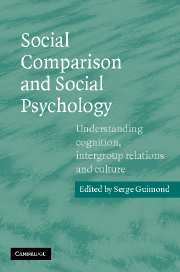Book contents
- Frontmatter
- Contents
- List of figures
- List of tables
- List of contributors
- Preface
- Introduction: social comparison processes and levels of analysis
- Part 1 Cognition: comparison processes within and between individuals
- Part 2 Intergroup relations: comparison processes within and between groups
- Part 3 Culture: comparison processes within and across cultures
- 11 Stereotype content across cultures as a function of group status
- 12 The cultural norm of individualism and group status: implications for social comparisons
- 13 Ambivalent sexism, power distance, and gender inequality across cultures
- 14 Social comparisons across cultures I: Gender stereotypes in high and low power distance cultures
- 15 Social comparisons across cultures II: Change and stability in self-views – experimental evidence
- Author index
- Subject index
- References
15 - Social comparisons across cultures II: Change and stability in self-views – experimental evidence
Published online by Cambridge University Press: 27 October 2009
- Frontmatter
- Contents
- List of figures
- List of tables
- List of contributors
- Preface
- Introduction: social comparison processes and levels of analysis
- Part 1 Cognition: comparison processes within and between individuals
- Part 2 Intergroup relations: comparison processes within and between groups
- Part 3 Culture: comparison processes within and across cultures
- 11 Stereotype content across cultures as a function of group status
- 12 The cultural norm of individualism and group status: implications for social comparisons
- 13 Ambivalent sexism, power distance, and gender inequality across cultures
- 14 Social comparisons across cultures I: Gender stereotypes in high and low power distance cultures
- 15 Social comparisons across cultures II: Change and stability in self-views – experimental evidence
- Author index
- Subject index
- References
Summary
This chapter reports on the results of a cross-cultural study of the effects of social comparison on self-construal among eight nations/cultures. It follows a previous report on five of these cultures (Guimond, Branscombe, Brunot, Buunk, Chatard, Désert, Garcia, Haque, Martinot, and Yzerbyt, 2005) and is linked to the previous chapter outlining some findings of the study in terms of gender stereotyping.
Past research and the specific contributions found in this volume indicate that social comparison processes are involved in many different attitudes and social behaviors. At the most general level, social comparison is a fundamental process by which knowledge is acquired. Indeed, most social psychologists would agree that social comparison is perhaps first and foremost critical for the creation of self-knowledge. To know who we are, we compare ourselves with others, or with ourselves in the past (see Part One, this volume). Some major developments in personality and social psychology have occurred by studying the self across cultures (see Berry, Poortinga, Segall, and Dasen, 1992; Markus and Kitayama, 1991; Shweder and Bourne, 1984; Triandis, 1989; see also Lorenzi-Cioldi and Chatard, this volume). For example, in their influential paper, Markus and Kitayama (1991) reviewed evidence suggesting that the self is defined in fundamentally different ways in western as opposed to eastern cultures. The western conception of self, and for several decades the only conception as far as social and personality psychologists were concerned, is that of an individual who is separate, autonomous, and composed of a set of discrete traits, abilities, and motives.
- Type
- Chapter
- Information
- Social Comparison and Social PsychologyUnderstanding Cognition, Intergroup Relations, and Culture, pp. 318 - 344Publisher: Cambridge University PressPrint publication year: 2005
References
- 1
- Cited by



